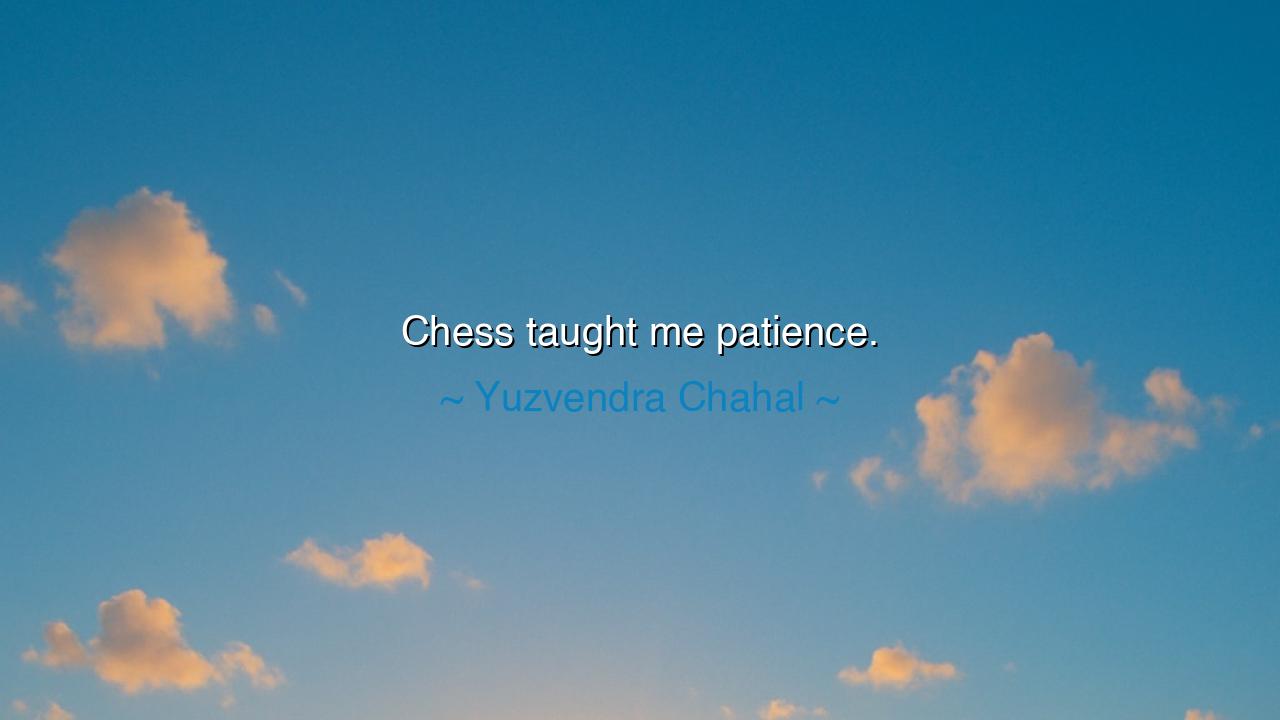
Chess taught me patience.






The words of Yuzvendra Chahal, master of spin upon the cricket field and once a competitor upon the chessboard, carry the quiet authority of lived experience: “Chess taught me patience.” In these few syllables lies a universe of wisdom, for chess is no mere game of wooden pieces and black-and-white squares — it is a mirror of life itself, demanding foresight, endurance, and restraint. To endure in chess is to learn the sacred art of waiting, to see not only the move before you, but the cascade of possibilities that follow, stretching into the unseen future.
The meaning begins with patience, the virtue at the heart of both chess and life. In the game, haste leads to ruin. A move made in anger, in excitement, or in overconfidence can unravel the labor of hours. The wise player waits, watches, and considers, even when desire presses him to act. This discipline of holding back, of enduring in silence until the time is right, is the essence of patience. In confessing that chess taught him this virtue, Chahal acknowledges that true strength is not always in action, but often in restraint.
The origin of this insight lies in Chahal’s own journey. Before becoming a celebrated cricketer, he represented India as a chess player in youth championships. The lessons of the board followed him to the field. As a leg-spinner in cricket, his craft requires the same patience: setting up a batsman with subtle variations, waiting for the moment when the prey is caught in the trap. The discipline of the chessboard prepared him for the discipline of the pitch. In both arenas, impatience is weakness; patience is the key to triumph.
History itself affirms this truth. Consider the great Viswanathan Anand, the Indian Grandmaster, who spent hours, even days, preparing strategies that unfolded like rivers across the board. His victories were not only the product of brilliance but of patience — waiting for the perfect moment to strike. Or recall Bobby Fischer, who once stared at the board in silence for nearly an hour before moving, knowing that one patient decision was worth more than a dozen rushed ones. Through them we see that in chess, as in life, patience is not passive waiting, but active endurance, filled with awareness and intention.
Beyond chess, this lesson shines across the centuries. The farmer waits patiently for the seed to grow, knowing he cannot hasten the rains. The general waits for the enemy’s error before he strikes. The prophet waits upon the promise of heaven, trusting that time will bring fulfillment. In each case, it is patience that guards against despair and ensures that action, when it comes, is wise and fruitful.
The lesson for us is luminous: cultivate patience not as weakness, but as power. Learn from the chessboard that rushing brings ruin, but waiting with intention brings reward. When faced with life’s choices, resist the urge to act in haste. Instead, pause, consider, and allow wisdom to ripen before you move. Patience is the armor against regret and the ally of success.
Practical action flows easily from this teaching. Practice waiting in small matters, so that you may endure in great ones. In conversation, listen fully before replying. In work, plan carefully before executing. In dreams, pursue steadily rather than grasping at shortcuts. And in hardship, endure without surrender, trusting that the passage of time itself is often the silent craftsman of victory.
Thus, let Yuzvendra Chahal’s words echo as a teaching for generations: “Chess taught me patience.” For patience is not only a virtue of the board, but a virtue of the battlefield, of the farm, of the home, and of the heart. Let us learn from the game that endurance is strength, that restraint is wisdom, and that those who master patience shall one day master destiny itself.






AAdministratorAdministrator
Welcome, honored guests. Please leave a comment, we will respond soon